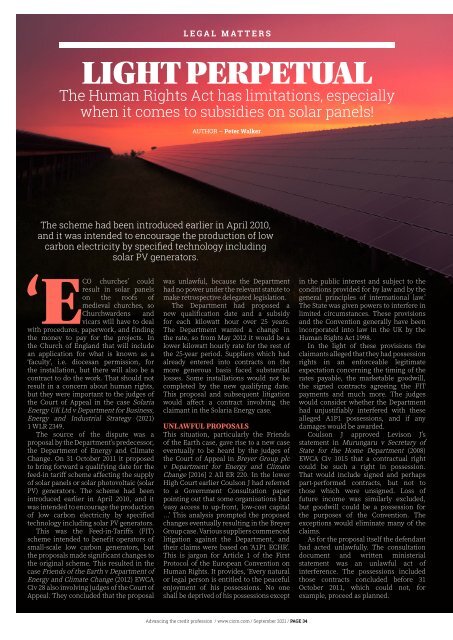CM September 2021
Create successful ePaper yourself
Turn your PDF publications into a flip-book with our unique Google optimized e-Paper software.
LEGAL MATTERS<br />
LIGHT PERPETUAL<br />
The Human Rights Act has limitations, especially<br />
when it comes to subsidies on solar panels!<br />
AUTHOR – Peter Walker<br />
The scheme had been introduced earlier in April 2010,<br />
and it was intended to encourage the production of low<br />
carbon electricity by specified technology including<br />
solar PV generators.<br />
churches’ could<br />
result in solar panels<br />
on the roofs of<br />
medieval churches, so<br />
Churchwardens and<br />
‘ECO<br />
vicars will have to deal<br />
with procedures, paperwork, and finding<br />
the money to pay for the projects. In<br />
the Church of England that will include<br />
an application for what is known as a<br />
‘faculty’, i.e. diocesan permission, for<br />
the installation, but there will also be a<br />
contract to do the work. That should not<br />
result in a concern about human rights,<br />
but they were important to the judges of<br />
the Court of Appeal in the case Solaria<br />
Energy UK Ltd v Department for Business,<br />
Energy and Industrial Strategy (<strong>2021</strong>)<br />
1 WLR 2349.<br />
The source of the dispute was a<br />
proposal by the Department’s predecessor,<br />
the Department of Energy and Climate<br />
Change. On 31 October 2011 it proposed<br />
to bring forward a qualifying date for the<br />
feed-in tariff scheme affecting the supply<br />
of solar panels or solar photovoltaic (solar<br />
PV) generators. The scheme had been<br />
introduced earlier in April 2010, and it<br />
was intended to encourage the production<br />
of low carbon electricity by specified<br />
technology including solar PV generators.<br />
This was the Feed-in-Tariffs (FIT)<br />
scheme intended to benefit operators of<br />
small-scale low carbon generators, but<br />
the proposals made significant changes to<br />
the original scheme. This resulted in the<br />
case Friends of the Earth v Department of<br />
Energy and Climate Change (2012) EWCA<br />
Civ 28 also involving judges of the Court of<br />
Appeal. They concluded that the proposal<br />
was unlawful, because the Department<br />
had no power under the relevant statute to<br />
make retrospective delegated legislation.<br />
The Department had proposed a<br />
new qualification date and a subsidy<br />
for each kilowatt hour over 25 years.<br />
The Department wanted a change in<br />
the rate, so from May 2012 it would be a<br />
lower kilowatt hourly rate for the rest of<br />
the 25-year period. Suppliers which had<br />
already entered into contracts on the<br />
more generous basis faced substantial<br />
losses. Some installations would not be<br />
completed by the new qualifying date.<br />
This proposal and subsequent litigation<br />
would affect a contract involving the<br />
claimant in the Solaria Energy case.<br />
UNLAWFUL PROPOSALS<br />
This situation, particularly the Friends<br />
of the Earth case, gave rise to a new case<br />
eventually to be heard by the judges of<br />
the Court of Appeal in Breyer Group plc<br />
v Department for Energy and Climate<br />
Change [2016] 2 All ER 220. In the lower<br />
High Court earlier Coulson J had referred<br />
to a Government Consultation paper<br />
pointing out that some organisations had<br />
‘easy access to up-front, low-cost capital<br />
…’ This analysis prompted the proposed<br />
changes eventually resulting in the Breyer<br />
Group case. Various suppliers commenced<br />
litigation against the Department, and<br />
their claims were based on ‘A1P1 ECHR’.<br />
This is jargon for Article 1 of the First<br />
Protocol of the European Convention on<br />
Human Rights. It provides, ‘Every natural<br />
or legal person is entitled to the peaceful<br />
enjoyment of his possessions. No one<br />
shall be deprived of his possessions except<br />
in the public interest and subject to the<br />
conditions provided for by law and by the<br />
general principles of international law.’<br />
The State was given powers to interfere in<br />
limited circumstances. These provisions<br />
and the Convention generally have been<br />
incorporated into law in the UK by the<br />
Human Rights Act 1998.<br />
In the light of these provisions the<br />
claimants alleged that they had possession<br />
rights in an enforceable legitimate<br />
expectation concerning the timing of the<br />
rates payable, the marketable goodwill,<br />
the signed contracts agreeing the FIT<br />
payments and much more. The judges<br />
would consider whether the Department<br />
had unjustifiably interfered with these<br />
alleged A1P1 possessions, and if any<br />
damages would be awarded.<br />
Coulson J approved Levison J’s<br />
statement in Murungaru v Secretary of<br />
State for the Home Department (2008)<br />
EWCA Civ 1015 that a contractual right<br />
could be such a right in possession.<br />
That would include signed and perhaps<br />
part-performed contracts, but not to<br />
those which were unsigned. Loss of<br />
future income was similarly excluded,<br />
but goodwill could be a possession for<br />
the purposes of the Convention. The<br />
exceptions would eliminate many of the<br />
claims.<br />
As for the proposal itself the defendant<br />
had acted unlawfully. The consultation<br />
document and written ministerial<br />
statement was an unlawful act of<br />
interference. The possessions included<br />
those contracts concluded before 31<br />
October 2011, which could not, for<br />
example, proceed as planned.<br />
Advancing the credit profession / www.cicm.com / <strong>September</strong> <strong>2021</strong> / PAGE 34


















